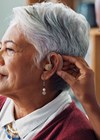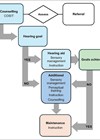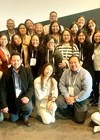Published in print under the title
Hearing care and dementia: professional insights on the new Lancet Commission findings
The Lancet Commission on ‘Dementia prevention, intervention and care: 2024 report’ highlights a list of potential modifiable factors to reduce dementia risk. As with the 2017 and 2022 publications, mid-life hearing loss is one such risk. Here, a range of key opinion leaders give their thoughts on the commission’s 2024 publication. Across the three articles, the authors present a synopsis of the recommendations pertinent to hearing loss and probe the evidence, the missing gaps and their own thoughts on a direction for research to unpack the emotive association between dementia and hearing loss.
See also:
Commentary: dementia, hearing loss, and the danger of professional rabbit holes
Aligning hearing and cognitive healthcare in older people
In The Lancet Commission’s latest important report on dementia prevention and care, hearing loss is again highlighted as a key modifiable risk factor. The report says the evidence that treating hearing loss decreases dementia risk is now stronger than it was in 2020, when The Lancet’s first landmark report was published. In a number of the studies analysed for this most recent report, it was found that every 10 dB decrease in hearing ability increased dementia risk.
In the report, ‘hearing aids’ is the key recommendation offered to tackle hearing loss. In a review of eight studies, people with hearing loss who used hearing aids had a significantly lower risk of dementia than those who did not use them. The growing evidence for hearing aids as a way to lower dementia risk is a really positive step.

Image courtesy of https://stock.adobe.com
But what I’m most interested in now is what we can do to help prevent hearing decline and ameliorate its impact before hearing aids are needed. The report states that we need to be ambitious about dementia prevention. It seems to me that investigating how novel, innovative and accessible approaches to hearing care could power earlier intervention for hearing loss is suitably ambitious and could also seriously move the dial. One such approach is auditory training, which is a powerful way to train our brains to get more from the sounds we hear and is already showing promise. Our research at eargym preliminary shows that targeted exercises and regular practice can improve listening skills like speech perception by up to 20%.
The challenge facing clinical and academic researchers in this area is accessing hearing health data from the general population which they can track over time. This is why we recently launched a large-scale research project to gather more data into the effectiveness of hearing training in mitigating the impact of hearing loss. It would be encouraging to see more research undertaken to understand whether auditory training could directly contribute to lowered dementia risk.
Although more data is needed, it’s also possible that by tackling the dementia risk associated with hearing loss, we can simultaneously mitigate the risk associated with social isolation (which is also highlighted in The Lancet report). Social isolation has long been associated with hearing loss [1] and, as a hearing aid user myself, it’s clear why: unaddressed hearing loss can be frustrating and isolating, prompting many to withdraw from social interactions to avoid communication difficulties and discomfort. At its most severe, isolation and loneliness can lead to cognitive decline and poor mental health. On the flip side, community and socialising are associated with decreased dementia risk. It seems to me that if we could improve hearing health before communication challenges become severe, we could empower more people to engage in sociable and productive lives, and help tackle two avoidable dementia risks.
Much like dementia, hearing loss is not an inevitable consequence of ageing. Hearing aids have real value, but they can’t be the only solution. In order to reduce the risk of preventable or unaddressed hearing loss contributing to dementia, researching new and innovative interventions which can have an impact even earlier than hearing aids should come next.
Reference
1. Shukla A, Harper M, Pedersen E, et al. Hearing Loss, Loneliness, and Social Isolation: A Systematic Review. Otolaryngol Head Neck Surg 2020;162(5):622–33.











